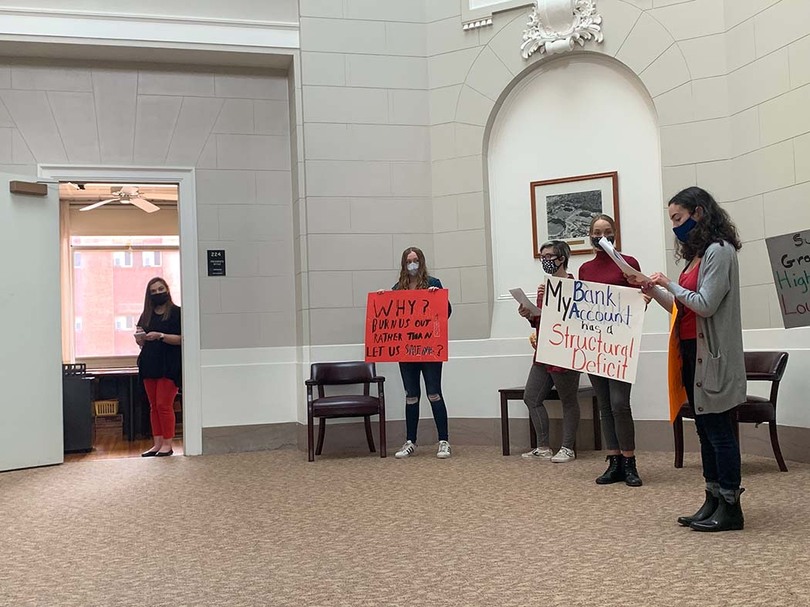SUNY-ESF graduate workers continue appeal for better working conditions, higher pay

Julia Niehoff | Contributing Writer
Graduate student workers presented a petition to ESF administration at a protest in October.
Get the latest Syracuse news delivered right to your inbox.
Subscribe to our newsletter here.
UPDATED: Dec. 6, 2021 at 6:24 p.m
A month after protesting outside their school and presenting a petition to the college’s president and vice president, graduate student workers at SUNY-ESF are still improving their working conditions.
The protest mainly revolved around stipend amounts for graduate workers, which they said was insufficient for the cost of living in Syracuse. One of the issues was the fact that student fees offset the stipend graduate student workers currently receive.
The average stipend for master’s-level students at ESF is about $14,000 per academic year, according to their graduate school website, while doctoral students receive about $16,000.
Shelby Zangari, an elected representative for the Graduate Student Employees Union, a statewide collective of teaching assistants and other graduate employees, said that the GSEU has had to pressure the college’s administration to stop reducing these stipends, even though students struggle to cover the cost of living. The annual pre-tax cost of living in Syracuse for a single adult with no children is currently estimated to be about $29,000.
“We’re making over $10,000 less than that,” Zangari said. “Which is really quite appalling considering how heavily the university relies on us to teach its courses and labs.”
Rose Osborne, a business agent at-Large for the GSEU, said that student fees, which are generally due in mid-August, make these stipends unrealistic for those that work and research at the same time.
The students’ petition was signed by over 170 people and called for the fees to be abolished.
“Many of (the students) have been without summer funding, without a paycheck,” Osborne said. “And then in August, they’re hit with these fees where they have to pay to maintain student status so that they can be eligible for employment. So it’s pay to work.”
ESF held meetings with the GSEU business agent-at-large, the graduate student representative for the ESF Board of Trustees and the GSA President after the protest and is currently in conversations with the Board of Trustees about options to bring grad students relief, according to a spokesperson.
Another issue SUNY-ESF graduate students have had to deal with involves contact tracing. The GSEU wrote an opinion article in October that SUNY-ESF relied on Syracuse University’s contact tracing system, which notified students who were potentially exposed to COVID-19 through email but depended on faculty members to notify their teaching assistants.
“There’s these big gaps between a TA potentially being exposed in the classroom while teaching and then knowing about it,” Osborne said. “And that’s interfering with their ability to make good decisions about their own health and the health of the ESF community.”
When the pandemic made returning to classes an uncertainty before the fall 2020 semester, the GSEU felt sidelined by SUNY-ESF’s planning process. Osborne said at the time that, while other colleges she works with as a representative for the GSEU had presented her with draft plans for the return of students so she could gauge the opinions of grad students and teaching assistants, SUNY-ESF made no such effort.
The fact that this semester is the third with in-person instruction since the pandemic means that SUNY-ESF should have had more efficient contact tracing procedures far earlier, Osborne said.
“This is too important to be dawdling on like ESF has done,” she said. “It’s also ridiculous to act like they don’t know how to do something that’s frankly not that hard. And they’ve had a year and a half to figure it out.”
Both Osborne and Zangari said the repeated attempts from SUNY-ESF graduate students to institute change in the college’s stipend and COVID-19 procedures have made students frustrated.
“We’re tired,” Osborne said. “We don’t want to have to put all this energy into basic levels of respect and dignity in our workplace. We want to just do our jobs and do our research.”
Clarification: A previous version of this post stated that ESF held meetings with the GSEU. The meetings were specifically with the GSEU Business agent at-Large, and also included the GSA President and the Elected Graduate Student Representative for the ESF Board of Trustees.





